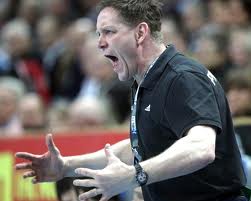Well, of course not! In a certain other continent, this would not have been so surprising, if one thinks back to the scandal involving the qualifications for the 2008 Olympics, but surely not in Europe. So when Kiel’s coach Alfred Gislason openly expressed this accusation to the media following the Kiel-Barcelona quarterfinal on May 1, the issue is not really whether his accusation had merit but why on earth is the EHF dealing with it in such a slow and bureaucratic manner!?
I know from experience that international and continental sports federations tend to be very formal and meticulous in dealing with disciplinary matters, and their regulations and procedures are often not set up to deal with urgent matters very swiftly. And generally speaking, I have full respect for the concept of ‘due process’. But here we are dealing with a matter that is both absolutely clear-cut and extremely serious. There can be no doubt or dispute about what Gislason said. And there can be no disagreement about how potentially damaging and completely unacceptable his action was.
Coaches are entitled to be frustrated after a key defeat and to have whatever opinions they want. Up to a point, one can even tolerate some criticism of referees in public. But there must be no tolerance for public statements that amount to asserting a complete lack of integrity on the part of the EHF, a pair of referees who deservedly enjoy a high reputation, and our sport as a whole! For such extreme cases, special procedures must exist under which swift and serious punishment can be meted out. Such a case just cannot be allowed to drag on!
It is simply not good enough that the EHF after about ten days announced that “it has filed a claim with its Arbitration Tribunal”, and that after one more week there is no result and punishment. In the meantime, Gislason is coaching Kiel in an IHF event, where he and his team are official representatives of Europe and the EHF!! By comparison, in the context of NBA, NHL or the NFL, a decision and a suspension with immediate effect would have been in place within 24 hours. The EHF, with its extensive competition activities and frequent matches, must ensure that an ’emergency procedure’ exists. (And by the way, this kind of case illustrates why it is a bit awkward that the lowest level disciplinary body is labeled ‘Arbitration Tribunal’…).
I could stop there, because this is really the essence of the matter. But it does cause me to comment on a couple of other aspects.
First, it has been rather interesting to read some of the comments in the German media. Here one can find unbiased reports which recognize that Kiel played an unusually weak game against Barcelona, also when taking into account injury issues and other shortcomings of the line-up. And it was also very clear that Omeyer had an extremely poor game, not just by his high standards but by any comparison. Writers commented that Gislason, apparently like on several other occasions, had shown too much deference to his star goalie, not having the courage to take him out much earlier. So it seems that it requires much less courage to blame it all on the referees and the EHF…
Second, there is one aspect of Gislason’s statement that may not have been given enough attention in media. It may have its specific advantages to have a German-Spanish rivalry in the EHF club events, but it is rather doubtful that this is healthy and stimulating for the longer-term development. Surely, the currently utopian idea of having eight countries from different parts of Europe represented in the quarter-finals would create even more widespread enthusiasm. Football has a bit of an advantage in this respect, although admittedly precisely this year’s Europa League final causes similar grumbling. Of course, the existing situation reflects a reality that nobody could quickly or easily change. So one can only hope that economic circumstances will permit other leagues, or at least individual clubs, to increase their efforts to become more fully competitive.
